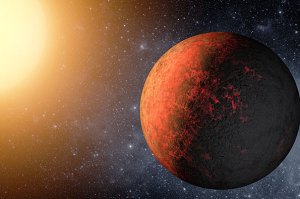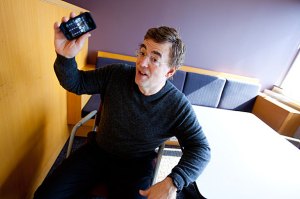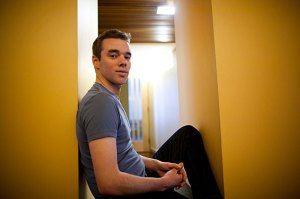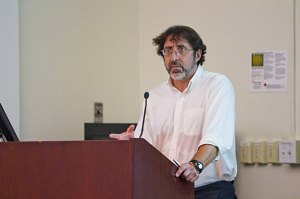Tag: Peter Reuell
-
Campus & Community
Building community, one note at a time
Now 59, Gregg Moore is set to receive a master’s from the Graduate School of Education, which he plans to use to foster community arts programs, with an emphasis on music education, as a way to bring disparate groups together. It’s an idea inspired by his career as a professional tubist in Europe, where he…

-
Health
Vivid details
A landmark effort to sequence the genome of the butterfly Heliconius melpomene has revealed that it shares genes that control color patterns with two species that closely mimic its appearance — Heliconius timareta and Heliconius elevatus — suggesting that all three exchange genes as a result of occasional hybridization.
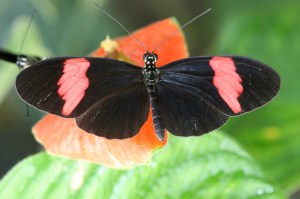
-
Science & Tech
New tool to battle illegal trade in animals
Harvard’s Center for Geographic Analysis will work with United Nations University on a system that will allow users to track and map wildlife crime, and how it is related to a host of socioeconomic factors.
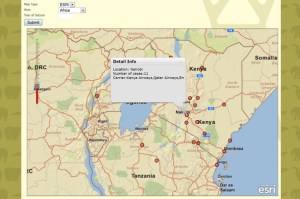
-
Health
Turing was right
Researchers at Harvard have shown that Nodal and Lefty — two proteins linked to the regulation of asymmetry in vertebrates and the development of precursor cells for internal organs — fit a mathematical model first described by Alan Turing six decades ago.

-
Science & Tech
Illuminating carbon’s climate effects
Harvard researchers compiled ice and sedimentary core samples collected from dozens of locations around the world, and found evidence that while changes in Earth’s orbit may have touched off a warming trend, increases in CO2 played a far more important role in pushing the planet out of the ice age.
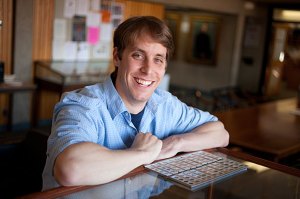
-
Science & Tech
Elegant entanglement
Harvard scientists have taken a critical step toward building a quantum computer — a device that could someday harness subatomic particles such as electrons to perform calculations far faster than the most powerful supercomputers.

-
Campus & Community
Stephen Greenblatt wins Pulitzer Prize
Stephen Greenblatt, the John Cogan University Professor of the Humanities, was awarded the 2012 Pulitzer Prize for general nonfiction for “The Swerve: How the World Became Modern.”

-
Science & Tech
You, revealed
“X-Rays of the Soul: Rorschach and the Projective Test,” at Harvard’s Collection of Historical Scientific Instruments, tells the story of the projective test movement and portrays the heady confidence that science could be used to extract and access the most human parts of human beings.
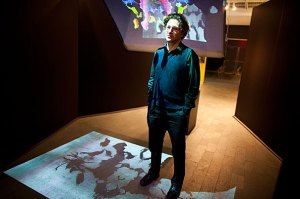
-
Campus & Community
A peek into Harvard classrooms
The Faculty of Arts and Sciences is launching a new video series, called “Harvard’s Great Teachers,” which will highlight Harvard’s world-class faculty and offer a sampling of the exciting and innovative teaching experienced by Harvard students.

-
Science & Tech
New frontier in archaeology
Jason Ur, the John L. Loeb Associate Professor of the Social Sciences, worked with Bjoern Menze of MIT to develop a system that identified ancient settlements based on a series of factors — including soil discolorations and the distinctive mounding that results from the collapse of mud-brick settlements.
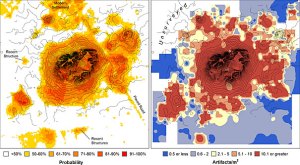
-
Science & Tech
A vision of computing’s future
In 1978, while a student at Harvard Business School, Dan Bricklin conceived of VisiCalc, the first electronic spreadsheet program for personal computers. The result helped to spark a digital revolution in business and made desktop computers a must-have item in many offices.
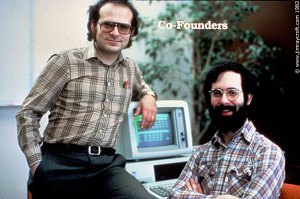
-
Health
Rock sleuths
In one of the largest studies of its kind, Harvard researchers have found that carbon records from the mid-Neoproterozoic era can be “read” as a faithful snapshot of the surface carbon cycle between 717 million and 635 million years ago, a finding that directly challenges a decades-long belief of most scientists.
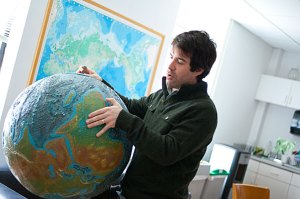
-
Science & Tech
Magnetism on the moon
A team of researchers from Harvard, MIT, and the Institut de Physique du Globe de Paris have proposed a surprisingly simple explanation for magnetic anomalies that have baffled scientists since the mid-1960s, suggesting they are remnants of a massive asteroid. As described in a paper published in Science, the researchers believe an asteroid slammed into…

-
Campus & Community
A peek at Harvard’s future
Maya Jasanoff and her faculty colleagues gathered at the Tsai Auditorium on Feb. 16 and March 7 to consider how the Faculty of Arts and Sciences (FAS) may look in a generation. The discussions were part of the Conversations @ FAS series, which this year asks some of Harvard’s leading scholars to imagine the faculty…
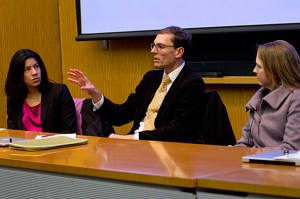
-
Science & Tech
A new view of DNA
A new imaging technique, developed by Erez Lieberman-Aiden, a Junior Fellow of the Society of Fellows, is giving scientists their first three-dimensional view of the human genome, one that is already shedding new light on a number of what Liberman-Aiden calls the “central mysteries of biology.”

-
Campus & Community
FAS recognizes outstanding staff members
Faculty of Arts and Sciences Dean Michael D. Smith honored the 44 recipients of the third annual Dean’s Distinction awards in a ceremony and reception March 1 in the Faculty Room of University Hall.
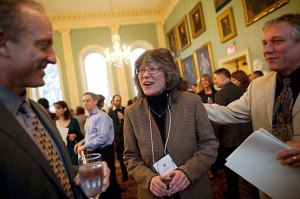
-
Health
In the genes, but which ones?
A team of researchers, led Harvard Professor David I. Laibson and Christopher F. Chabris of Union College, has found that virtually all claims that intelligence is associated with specific genes are wrong.

-
Nation & World
Fostering global understanding
A panel of scholars made up of the directors of the Prince Alwaleed Bin Talal Centers met to discuss how to promote better understanding between the Islamic world and the West.

-
Campus & Community
GSAS Dean Allan Brandt to step down
Harvard Graduate School of Arts and Sciences Dean Allan M. Brandt, who pioneered a new approach to curricular development with the launch of the Graduate Seminars in General Education, announced Feb. 15 that he will step down as GSAS dean this spring owing to health considerations. He plans to return to the faculty when his…
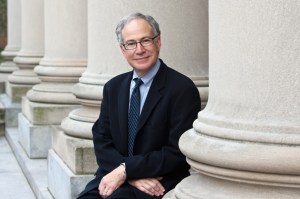
-
Health
A swimsuit like shark skin? Not so fast
Experiments conducted in a Harvard lab reveal that, while sharks’ sandpaperlike skin does allow the animals to swim faster and more efficiently, the structure of some high-tech swimsuits has no effect when it comes to reducing drag as swimmers move through the water.
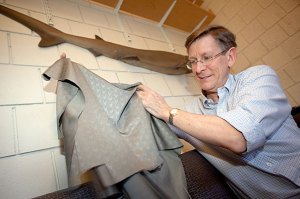
-
Health
Deciding to go left or right
Researchers in a Harvard lab have developed a device, dubbed LADY GAGA, that allows them for the first time to precisely control airborne scents. They have used the device in their work unraveling how animals make navigational decisions based on their environment.
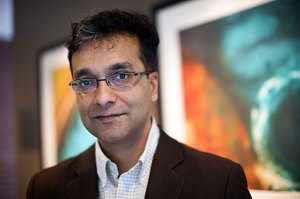
-
Campus & Community
From impostors to chocolate
For hundreds of students in Harvard’s Graduate School of Arts and Sciences, January included financial-planning seminars, classes about the history and politics of chocolate, and workshops on answering tough questions in job interviews.
-
Health
Clues to addiction
Harvard scientists have developed the fullest picture yet of how neurons in the brain interact to reinforce behaviors that range from learning to drug use, a finding that could open the door to new treatments for addiction.
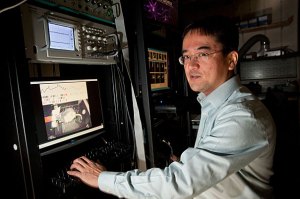
-
Science & Tech
Map making, made easy
Developed by Harvard’s Center for Geographic Analysis, WorldMap allows scholars to create, share, and publish maps and other geospatial data.
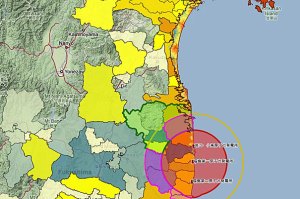
-
Science & Tech
Of orbits and ice ages
In a paper published in the journal Nature, Harvard Professor of Earth and Planetary Sciences Peter Huybers confirms that changes in the orientation of the Earth’s spin axis have contributed to periods of major deglaciation in the past million years.
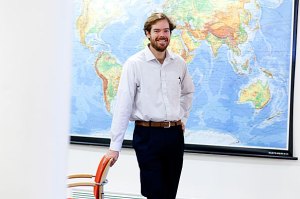
-
Science & Tech
Reading life’s building blocks
A team led by Harvard researcher Charles Lieber has for the first time succeeded in creating a device that opens the door to using tiny holes called nanopores in an electrically charged membrane to quickly and easily sequence DNA.
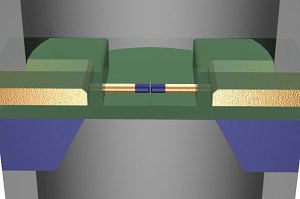
-
Science & Tech
Alien worlds, just like home
Harvard astronomers, working as part of NASA’s Kepler mission, have detected the first Earth-sized planets orbiting a distant star, a milestone in the hunt for alien worlds that brings scientists one step closer to their ultimate goal of finding a twin Earth.
